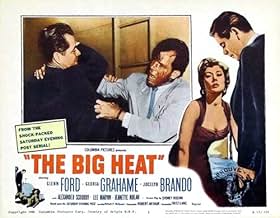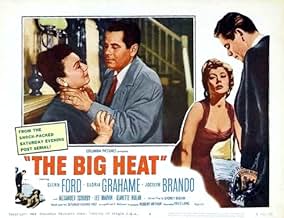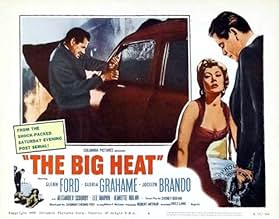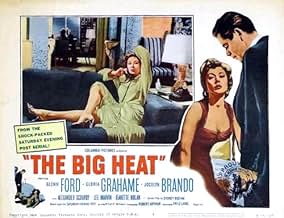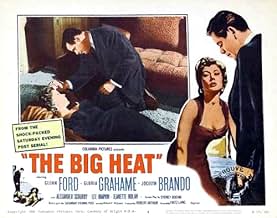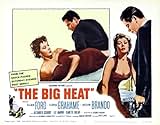Tough cop Dave Bannion takes on a politically powerful crime syndicate.Tough cop Dave Bannion takes on a politically powerful crime syndicate.Tough cop Dave Bannion takes on a politically powerful crime syndicate.
- Awards
- 2 wins & 2 nominations total
- Director
- Writers
- All cast & crew
- Production, box office & more at IMDbPro
Featured reviews
An honest, family man cop with a wife and daughter is put onto the investigation of another cop's suicide. He closes the case as suicide due to ill health. However when a women tells him another story and is promptly killed, Bannion just investigates further to find that powerful criminals and powerful politicians share the same table at dinner. When his family is split in an attack meant for him he loses his job and becomes bitter he starts to become more like his enemies as he pursues them.
This is a hardboiled thriller that would still stand up today as a tough film violence and attitudes that make it feel more modern than it is. The story follows the descent of family man Bannion into violence and bitterness when he not only loses what is important to him, but when he finds that corruption at high levels has fed down into rank and file officers causing him to stand out when he tries to catch a criminal.
The brutality of this film shouldn't be underestimated Fritz Lang is no softy! Here we have women beaten and killed, we have sex crimes, we have a women disfigured by scalding coffee in her face. Of course all these things are unseen but this was the 50's! However it is still powerful and adds to the intensity of the film. The story may well have been done many times now but imagine seeing something like this back then!
The cast are great. Ford descends into bitterness really well and seems at ease as both thug and family man. The female cast are good in different ways but the one that catches the eye is a young Lee Marvin. I suspect Marvin got fame because his coffee attack stuck in people's minds even today he is best know as a tough guy in the movies.
Overall this is well worth hunting out it is still being copied by many video thrillers and it just goes to show that you don't have to show gory or graphic violence on screen to be powerful, gritty or shocking.
This is a hardboiled thriller that would still stand up today as a tough film violence and attitudes that make it feel more modern than it is. The story follows the descent of family man Bannion into violence and bitterness when he not only loses what is important to him, but when he finds that corruption at high levels has fed down into rank and file officers causing him to stand out when he tries to catch a criminal.
The brutality of this film shouldn't be underestimated Fritz Lang is no softy! Here we have women beaten and killed, we have sex crimes, we have a women disfigured by scalding coffee in her face. Of course all these things are unseen but this was the 50's! However it is still powerful and adds to the intensity of the film. The story may well have been done many times now but imagine seeing something like this back then!
The cast are great. Ford descends into bitterness really well and seems at ease as both thug and family man. The female cast are good in different ways but the one that catches the eye is a young Lee Marvin. I suspect Marvin got fame because his coffee attack stuck in people's minds even today he is best know as a tough guy in the movies.
Overall this is well worth hunting out it is still being copied by many video thrillers and it just goes to show that you don't have to show gory or graphic violence on screen to be powerful, gritty or shocking.
It's doubtful that even Dirty Harry in his most menacing moments could match the smouldering rage that Glenn Ford brings to the screen in this excellent 1953 Fritz Lang flick. From a modern POV there is nothing unfamiliar here, except maybe the dated hardboiled lingo. The maverick cop, the revenge theme, the underworld characters and heroines. It's just that whereas a modern director would make this into a predictable two hour yawn-fest with slow-motion car accidents and ten minute shootouts with shoulder-launched missiles, Lang's movie clocks in at under 90 minutes, and there isn't an ounce of fat on it. It's lean, fast-moving and engrossing. Not a single camera shot is wasted or unnecessary. The script crackles, the cast is uniformly excellent, and Ford and Lee Marvin in particular are unforgettably intense. Ford, just when he's about to go way over the top, reins himself in, adding to the aura of barely suppressed violence in his character.
The movie can also lurch from plot exposition to sudden, economical and unexpected explosions of violence which can still shock today and must have been extremely confronting fifty years ago. And from there it can become suddenly, unexpectedly sensitive and moving.
Nothing is wasted in this movie. Everything is nailed down just right. It's not that they don't make them like this any more; it's more that they've been making them like this ever since, and generally to lesser and lesser effect.
A strong 8 out of 10.
The movie can also lurch from plot exposition to sudden, economical and unexpected explosions of violence which can still shock today and must have been extremely confronting fifty years ago. And from there it can become suddenly, unexpectedly sensitive and moving.
Nothing is wasted in this movie. Everything is nailed down just right. It's not that they don't make them like this any more; it's more that they've been making them like this ever since, and generally to lesser and lesser effect.
A strong 8 out of 10.
Coming full cycle, Hollywood seems to be back on the theme of good cop vs. bad cops controlled by the mob. Recently "16 Blocks" successfully pitted honest Bruce Willis against dishonest city hall. For a time, with "The Big Easy" being an early example, this type movie presented the image of a totally corrupt government from top to bottom with omnipresent mob ties indicating cynical times, even the one good cop being tainted, just not as much as others. "The Big Heat" is a prime example of this type film in the early Cold War period, emphasizing the importance of one good man standing up against all odds, in particular unconcerned citizens who either themselves become tainted or who are simply apathetic as long as they are left alone. "The Big Heat" like "High Noon" showed that the good must take a stand or the entire house will come crumbling down with the rodents taking over.
Glenn Ford was never a versatile actor. In the right role he could carry the load sufficiently to get by. In the wrong role, his acting was amateurish. That he had potential is indicated by his performances in two movies, "Gilda" and "The Big Heat." Arguably, his role as Det. Sgt. Dave Bannion is the better of the two. Perhaps it is the inimitable director Fritz Lang that prods Ford on to realize his true talents. There is no doubt that Ford makes Sgt. Bannion come alive and puts real flesh on his bones. Ford is so good in this film and in "Gilda" that he deserved more recognition than he got from the Hollywood big wigs.
The two shining performances are given by Gloria Grahame and Lee Marvin who run away with the show. They provide one of the legendary scenes in film history that just about everyone has either seen or read about, when Vince Stone (Marvin)--note the last name of Stone--pitches a container of boiling coffee into Debby Marsh's (Grahame) face, scarring her for life. Vince Stone's demise is also memorable. The coffee sequence alone is worth the price of admission.
Glenn Ford was never a versatile actor. In the right role he could carry the load sufficiently to get by. In the wrong role, his acting was amateurish. That he had potential is indicated by his performances in two movies, "Gilda" and "The Big Heat." Arguably, his role as Det. Sgt. Dave Bannion is the better of the two. Perhaps it is the inimitable director Fritz Lang that prods Ford on to realize his true talents. There is no doubt that Ford makes Sgt. Bannion come alive and puts real flesh on his bones. Ford is so good in this film and in "Gilda" that he deserved more recognition than he got from the Hollywood big wigs.
The two shining performances are given by Gloria Grahame and Lee Marvin who run away with the show. They provide one of the legendary scenes in film history that just about everyone has either seen or read about, when Vince Stone (Marvin)--note the last name of Stone--pitches a container of boiling coffee into Debby Marsh's (Grahame) face, scarring her for life. Vince Stone's demise is also memorable. The coffee sequence alone is worth the price of admission.
Normally, when I think of Film Noir, I DON'T think about Glenn Ford. Yes, he did a few, but his personality always seemed a little too "nice" to play in these gritty films. I was very pleasantly surprised then, when I saw this movie. Ford is an honest cop in a very crooked town. However, when the mob attacks and nearly kills him (killing his wife instead), he "pops a fuse" and becomes a very tough cop who won't take NO for an answer. I loved watching him slap people around and threaten his way to the top of the syndicate, as, with his life in ruins, he had nothing to lose.
Along the way, the headstrong Ford encounters a lot of amazing characters--all played exceptionally well. In particular, a young Lee Marvin gives perhaps his best supporting performances as a hood who has a penchant for beating up women. In one scene, he nearly breaks a bit actress' arm (and it happens to be Carolyn Jones in a performance before she was famous). In another scene, he throws scalding hot coffee in the face of his girlfriend, Gloria Grahame. It was so brutal and realistic, I flinched and found my stomach churning at its ferocity and cruelness. As for Miss Grahame, she plays the sort of excellent role she became known for--a "dame" who, down under layers and layers of scum, beats a real human heart.
Wonderful performances, terrific pacing and excellent writing make this one film well worth seeing and as a result, it's one of the best examples of Film Noir out there and a great example of a film about a cop who's seen enough and is on a rampage. This is probably Glenn Ford's best performance.
FYI--In what appears to be a cool inside joke, in one of the scenes where Ford is in the bar, the song "Mame" is playing in the background--the same song made so memorable by Rita Hayworth in GILDA--a Glenn Ford film from 1946.
Also FYI--I recently saw this film for the second time. I rarely watch films twice, but this one impressed me so much the first time, I couldn't resist. The film was, believe it or not, better the second time around and I noticed so many wonderful Film Noir touches that I truly love this movie.
Along the way, the headstrong Ford encounters a lot of amazing characters--all played exceptionally well. In particular, a young Lee Marvin gives perhaps his best supporting performances as a hood who has a penchant for beating up women. In one scene, he nearly breaks a bit actress' arm (and it happens to be Carolyn Jones in a performance before she was famous). In another scene, he throws scalding hot coffee in the face of his girlfriend, Gloria Grahame. It was so brutal and realistic, I flinched and found my stomach churning at its ferocity and cruelness. As for Miss Grahame, she plays the sort of excellent role she became known for--a "dame" who, down under layers and layers of scum, beats a real human heart.
Wonderful performances, terrific pacing and excellent writing make this one film well worth seeing and as a result, it's one of the best examples of Film Noir out there and a great example of a film about a cop who's seen enough and is on a rampage. This is probably Glenn Ford's best performance.
FYI--In what appears to be a cool inside joke, in one of the scenes where Ford is in the bar, the song "Mame" is playing in the background--the same song made so memorable by Rita Hayworth in GILDA--a Glenn Ford film from 1946.
Also FYI--I recently saw this film for the second time. I rarely watch films twice, but this one impressed me so much the first time, I couldn't resist. The film was, believe it or not, better the second time around and I noticed so many wonderful Film Noir touches that I truly love this movie.
This punchy little noir moves along at brisk clip. Glenn Ford simmers the whole time like a boiling kettle about to blow . This man has no pleasures that are obvious except his Westinghouse wife and child. Lee Marvin barely maintains control for much of the film. He is a catalogue of evil and greedy excess. Gloria Grahame is marvelous, witty, beautiful, bitter beyond hope. There is no redemption to be had for most of the characters in this sordid little universe. Conspiracy theorists of the 21st century will look back at the kind of simple-minded corrupt worldview espoused by Lang in this and other films and lament its loss. In THE BIG HEAT, evil and rot have names and faces and with enough fortitude, and the willingness to lose everything, they can be conquered. At least for a day. We know today that the whole infrastructure of power is poisoned beyond repair. The fifties held out a modicum of hope. Brief, fleeting hope. This is a violent film. Others have commented that much of the horror is committed off screen. But you can easily imagine it. Lang doesn't pull many punches here. The treadmill of denouement speeds up rapidly in the last few sections of the film. After viewing a film like THE BIG HEAT, I often want to wander down some dark street and find a corner diner, something like the one portrayed in Hoppers's NIGHTHAWKS, and have a cup of java, listen to some Brubeck on the jukebox, and wait for someone to come in from the chilly street . But the diners in my neighbourhood are either in the middle of the block or close early because of street crime. So I stay home, have a cup of tea, and dream noirish thoughts half asleep on my couch. This is a fine entry into the film noir lexicon.
Did you know
- TriviaColumbia wanted to borrow Marilyn Monroe from 20th Century-Fox to play the role of Debby Marsh, but Fox's asking price was too high. Gloria Grahame was cast instead.
- GoofsThe street address for the junkyard on Bannion's list is "101", yet the number "1024" is seen on a large sign over the yard's shed.
- Quotes
Debby Marsh: [to Bannion] Oh, well, you're about as romantic as a pair of handcuffs.
- ConnectionsFeatured in Mean Streets (1973)
- SoundtracksIt's a Blue World
(uncredited)
Written by Chet Forrest and Bob Wright
Heard instrumentally during one of the scenes at The Retreat
Details
Box office
- Gross worldwide
- $7,083
- Runtime
- 1h 29m(89 min)
- Color
- Aspect ratio
- 1.37 : 1
Contribute to this page
Suggest an edit or add missing content


